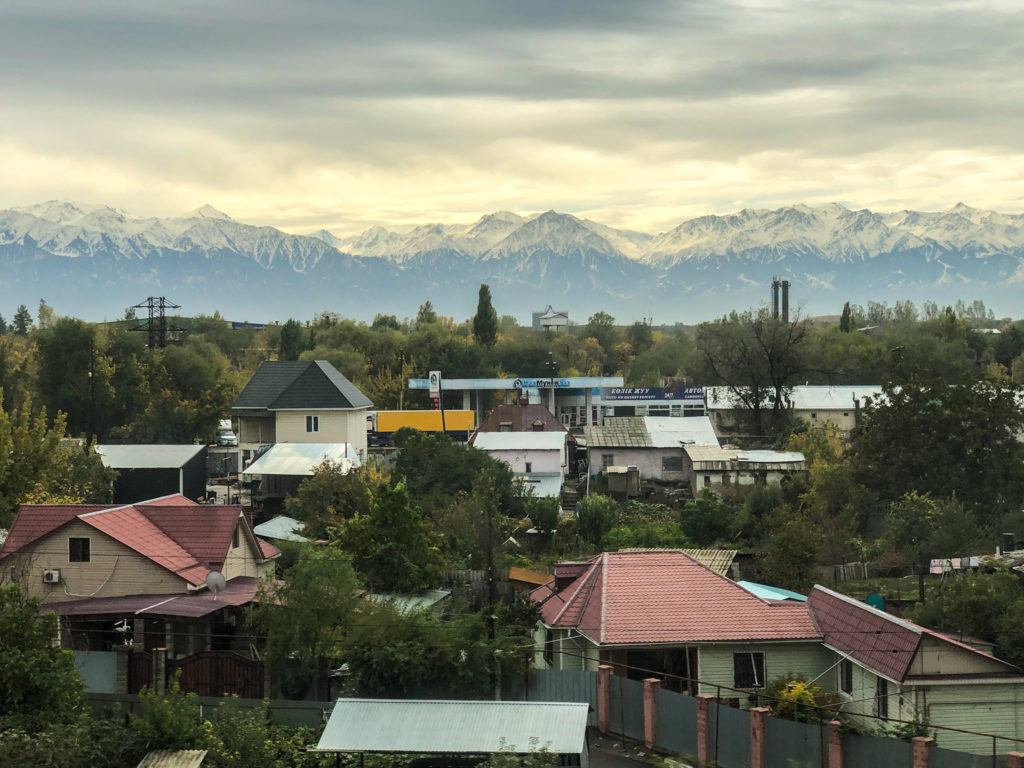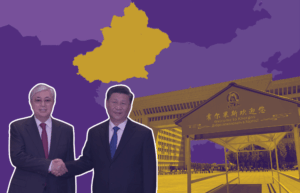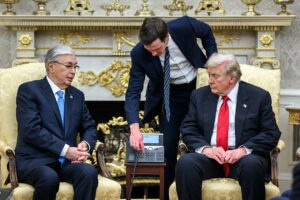As parts of Kazakhstan face new restrictions in 2021, Novastan looks back at life during the country’s second lockdown, from 5 July to 16 August 2020. Strict measures were enacted to slow down the crisis, impacting people’s daily lives.
A version of this article first appeared on Novastan’s French website on 11 August 2020.
The health crisis is still ongoing in Kazakhstan. In order to deal with the situation, new restrictions are in place in Nur-Sultan, the capital, and Almaty, the largest city.
It’s not the first time Kazakhstan faces restrictions due to Covid-19: one after the other, cities and regions imposed quarantine measures from March 2020, starting with Almaty and Nur-Sultan. These measures were lifted on 11 May, only for the country to enter a second lockdown on 5 July. Initially planned for 14 days, this second period of quarantine was extended to mid-August.
Want more Central Asia in your inbox? Subscribe to our newsletter here.
During the second lockdown, Novastan interviewed five locals about their experience. From Nur-Sultan to Almaty, this is the story of ordinary people fighting against an unprecedented health and economic crisis.
The first lockdown quickly established strict measures
After the appearance of the first cases of coronavirus in Kazakhstan on 13 March 2020, the largest country in Central Asia declared a first lockdown from mid-March to mid-May. The unprecedented situation considerably modified the population’s habits, who are usually more inclined to enjoy the great outdoors that Kazakhstan has to offer.
“The first quarantine was strict in our city,” Tasha Parshina, who lives in Almaty, told Novastan. “All of our outings were restricted, nobody was outside and there were nearly no cars around. Our city is very green and people like spending time outside, in terraces, in parks or just out on walks. It was unusual for our people to stay home, it was probably the first time in their lives this happened.”
However, the first lockdown did not stop the virus from spreading. As the harshest measures were lifted, precursory signs of a major resurgence of cases appeared.
“While the government decided to impose an early lockdown and declare a state of emergency as soon as the virus arrived in Kazakhstan, we found ourselves in a rather dramatic situation three months later,” Asel, another Almaty resident, said. “On 11 May, as soon as the relaxation of lockdown began, the number of cases started increasing. Towards the end of June, we also saw many pneumonia cases that appeared to come from complications of the virus.”
Hospitals rapidly found their capacities stretched, despite Kazakhstan being the richest country out of the former Soviet republics of Central Asia.
“I have many colleagues who work in hospitals that tell me how critical the situation really is. There are no more medical gowns, no medicine, no government support,” Aidana Ramazanova, who lives in Nur-Sultan, said.
Read more: Covid-19: Kazakhstan to use colour-coded system through new app
When the country recorded the most coronavirus cases in the region the government decided on less restrictive measures for the second lockdown, in an effort to revitalise the economy.
“This time the lockdown is lighter, so we could say that it’s only a partial lockdown. We can go out, we can move around,” Asel said. ‘‘It is recommended to stay at home, but it’s not forbidden to go out either. So I see a lot of people outside, even if places like markets or malls are closed. Cafés and restaurants cannot welcome clients inside: they are limited to 30 people on their terrace,” the young woman explained.
“The second lockdown is way less strict, people go to work and go out all the time,” Tasha Parshina agreed.
Economic weakening and distrust of the government and the media
The pandemic impact has had a severe impact on Kazakhstan’s economy. For many households, the crisis has accentuated the fragility of their situation.
“Many companies and shops have closed, including mine, and some haven’t reopened. This situation has put a lot of people in danger because there were many who didn’t have the necessary financial stability to allow them to be without work for several months,” Tasha Parshina said. “I think we are heading towards a very impactful crisis.”
Adana Ramazanova agrees: “Banks await people to pay their mortgages and their rents while unemployment has risen and new job opportunities are rare. It’s a vicious circle!”, says Aidana Ramazanova.
This worrisome economic situation leads to more and more citizens questioning the handling of the crisis by the government. “I don’t think that the second lockdown has been correctly understood or felt necessary as it’s not strict enough, everyone is going out,” Tasha Parshina said. “Some measures are incoherent, such as the restrictions on transport which are ridiculous: the number of buses on some lines have been reduced, leading to an over-attendance on those lines left. Social distancing is not respected on there, which generates more infections.”
“Public transport has completely stopped on Saturdays and Sundays: it forces me to go grocery shopping during the weekdays when I’m supposed to be working,” she added.“The list of measures that don’t make sense is still long. The tighter the lockdown, the more I feel the population’s anger. Nowadays, I don’t know a single person who feels favourable to the lockdown.”
Exacerbating inequalities
“Communication was badly handled: measures haven’t been planned properly nor coherently explained,” Asel said. “For example, when the health minister announced the relaxation of lockdown, shopping centres and markets prepared to reopen. But two days later, the president announced an extension of the same lockdown.”
Facing confusion between communication errors, real news, rumours and malicious misinformation, some of the population distrust traditional forms of media.
“Trust towards traditional media has never been that high and lots of fake news, each item more absurd than the last, circulates on social media and people really believe them!,” Tasha Parshina said. “Many throw the blame on emigration. Others have been convinced for a while that we are the only central Asian country to face such difficulties.”
On the other hand, with official media becoming less and less credible in the eyes of the population, the alternatives provided better information: “Independent media organisations united to launch their own website to count victims. It put pressure on the government and is partly the reason that the pneumonia cases will now be counted in the official statistics,” Asel explained.
Read more: Central Asia in 2020: the year in review
The miscommunications and lack of clarity in the government’s action has made much of the population question the credibility of the whole situation. “No one is fighting against the virus, but the government is fighting its people,” Sana Aikyn, from Nur-Sultan, said.
Aidana Ramazanova said: “I am sure that most of the people do not support the government’s strategy concerning Covid-19. Some don’t even believe in coronavirus. All the same, I don’t think that the government made all the right choices.”
“The fact is that we still are a young nation. Before independence [December 1991], our doctrine was based on a welfare state, the idea that government serves all,” Tasha Parshina went on. “The current situation showed that we have to count on ourselves first, before the government. And this reality is not easily accepted by most of the people.”
The pandemic and its consequences have highlighted social and economical inequalities, as all crises do. Kazakhstan is not an exception, with the daily news shedding light on a worrisome situation: “There wasn’t any space left in hospitals, the emergency services weren’t coming to people’s houses, it was impossible to take a test, those who became sick stayed at home without a chance to visit the hospital or see their doctors,” Aya Sharifkanova, of Nur-Sultan, said.
Similarly, Asel points out the importance of connections to get treatment: “A lot of people used personal connections such as relatives in order to get hospitalised, an X-ray or a test.”
Tasha Parshina added: “I think there is a separation between those who are able to work from home and are concerned by the health crisis, and those who don’t consider lockdown an effective measure but only economically damaging.”
Uncertain future
Will Kazakhstan have the resources to recover? Nothing is certain, as the situation seems fragile. “We are aware that the country is facing a great crisis. The health crisis should be over soon, but we will find ourselves in an economic crisis,” Asel said at the time.
“A third of small and medium-sized companies have closed or are about to. Lockdown has lasted so long and many people will continue being unemployed. We don’t know if the government will have sufficient resources to support the economy or social programs,” she added. “I do hope that from now on, the number of Covid cases will drop but at the moment there is no decrease, we count about 1,500 new cases per day”
Some Kazakhstanis assess their government’s difficulties in responding to the crisis as a disappointment. “This crisis has been a real ordeal for the government, for the people and for the healthcare system. Unfortunately no one has been up to the task,” Asel said.
However, others see the potential for political renewal. “When lockdown is over, I think a lot of shops and companies will have closed, a lot of people will be angry. There will be a number of people willing to emigrate and an overall feeling of general dissatisfaction towards the government’s actions. Maybe there will be a collective realisation,” Tasha Parshina concluded.
Some names have been changed.
Alexandra Tivet
Novastan.org
Translated from French by Lorraine Lavolley
Edited by Tommy Hodgson
For more news and analysis from Central Asia, follow us on Twitter, Facebook, Telegram, Linkedin or Instagram.
 Kazakhstan’s second lockdown told by those who lived it
Kazakhstan’s second lockdown told by those who lived it 



